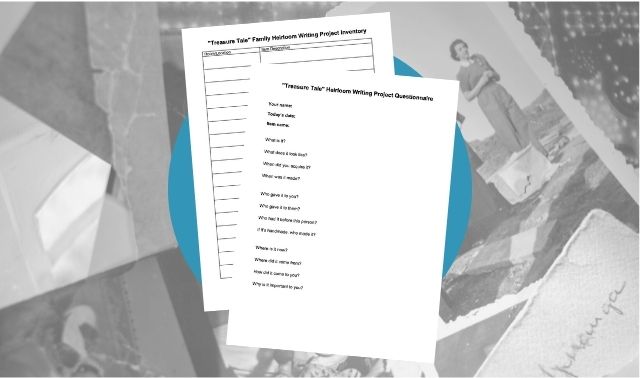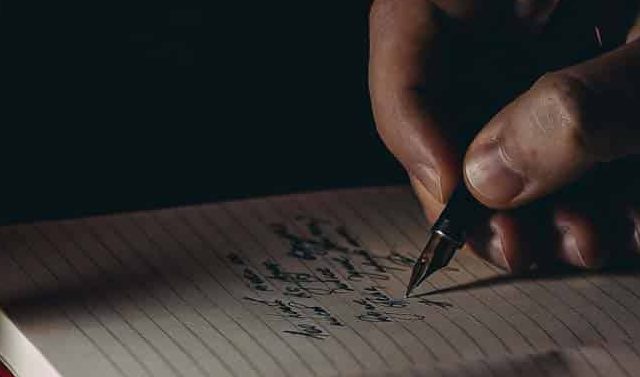Sign up for the Family Tree Newsletter Plus, you’ll receive our 10 Essential Genealogy Research Forms PDF as a special thank you!
Get Your Free Genealogy Forms
"*" indicates required fields

Use your research in new and creative ways! The editors of Family Tree Magazine have compiled this list of family history writing prompts to help you get inspired. The answers you provide can be shared on a family history website, put into a book or kept with other genealogy records.
Family History Writing Prompts
Imagine you are one of your descendants, far in the future, writing about your present self. Write about an event from your own history from that perspective
Imagine you are a newspaper reporter and write an article about an event in your family history based on your research. Remember to include the who, what, when, where and why if you can!
ADVERTISEMENT
Imagine your family represented as a literal “tree.” What kind of tree best represents your family’s story? What does it look like and why?
Did you grow up with any family traditions? What is the history behind the tradition? Do you practice any family traditions now?
Choose an event from your family’s history and write an alternative ending to it. Perhaps someone made a different choice or didn’t survive something; how would the course of your family’s history have changed?
ADVERTISEMENT
Pick two ancestors from your family’s history who didn’t know each other, then imagine a scene where the two meet. What would they talk about, and what would their first impressions be of each other?
Imagine a holiday celebration your ancestor participated in. Narrate it as accurately as possible.
Write a thank-you-note to an ancestor. Who are you thanking? What did they contribute that you are thankful for?
What types of meals did your ancestor eat? Describe a mealtime scene from your family’s history.
Choose a favorite couple from your family’s history (or imagine one) and write a love note or poem they might have shared. Take the historical period into consideration!
Write one or more “six word stories” about your family’s history. Channel your inner-Hemingway.
Write about surname origins. Do your findings lineup or conflict with what you know or believe about your ancestors’ homeland? If not, highlight the puzzle and try to piece together a plausible answer to it.
What’s the whackiest or most interesting story you’ve heard passed down in your family or discovered in your research?
What types of clothes did your ancestors wear? Pick and ancestor and describe them in detail; what are they wearing and why?
Are there any naming traditions in your family? Write the story of how that tradition started or the stories of ancestors with that name.
Imagine your ancestor encountering something for the first time (new place, new food, new invention, etc.). Describe their first impression in detail.
Write a letter as if you are one of your ancestors. Who is the letter for and what does it say?
Imagine your ancestor making a big decision and narrate how they arrived at their conclusion.
Ask a child, grandchild or sibling what one thing they would like to know or learn about their family history. Ask them why they want to know that piece of information.
Looking at your family history, write down five life lessons you feel you’ve learned from your ancestors. Write an essay for the benefit of sharing with your children, grandchildren, and future descendants.
If you were to write a book about your family history or an ancestor’s history, what genre would it be and why?
Do you have a favorite quote or family saying from your history? Write the story of how that quote or saying came to be.
Imagine your ancestor had social media during their lifetime. Write a Facebook post or series of tweets describing something they’re witnessing in real-time.
Select a family heirloom (watch, quilt, Bible, etc.) and write a narrative from its perspective. Where has it been? How did your ancestor acquire it, and what would it have encountered throughout the years? What important family milestones might it have witnessed?
Imagine a typical day for a female ancestor. What time did she wake up, and what did she do throughout the day?
Select two ancestors who lived in different time periods, and describe a scene of the two interacting with each other over dinner. What do they talk about? What do they have in common?
Imagine and describe an event in your family’s history from an outsider/observer’s perspective. What was it like to be there? How did the event make them feel?
If your family history/ancestor’s story was a novel, what would the theme be?
Imagine a route your ancestor took frequently in his or her daily life. Describe that route in detail. What did they see? What noises could they hear? Where were they going?
Think of your ancestor as a character in a story; describe them as an author would. Go into as much detail as possible: what do they look like, how does their voice sound, what are their strongest personality traits?
Record a memory of one of your ancestors that you want to pass down to future generations—a parent, grandparent, sibling, aunt, uncle, cousin, etc. Set the scene: How old were each of you at the time? What happened? Why is this a memory you treasure?
Write a brief biography of yourself—everything an ancestor might want to know about you. After all, someday your ancestors will want to know as much about you as you do about yours!
Come up with a pitch for your ancestor’s biography. Is it a sultry tell-all, or a just-the-facts? What major theme(s) does it cover? Be sure to give the bio a title and sub-title, and write the book’s summary as it would appear on the back cover.
Select an ancestor who served in the military, and write a letter to him or her from the perspective of a loved one on the home front. Ask about his or her health, or the conditions in the war. Read real-life wartime letters for inspiration.
Write a paragraph describing three items your ancestor would never leave home without. Why are these objects so important to your ancestor? Where did they come from?
Identify a major event that happened during your ancestor’s lifetime, and (as your ancestor) write a first-person journal entry describing it. What would your ancestor have thought about it? Would he have found it exciting? Frightening? Frustrating?
Write a paragraph or two about your ancestor and their best friend. Imagine an adventure they had (real or imagined) based on what you know of their childhood and the time period and place they lived.
Imagine one or more of your ancestors as the characters in a fairy tale or fable. What role would they play, and what is the setting? What would be their fate?
Pick an ancestor from the 1800s, drop him into today, and (as your ancestor) write a letter to family members still in the 1800s. How would he describe today? What surprises him? What questions would he have?
Write a diary or journal entry that details your immigrant ancestor’s journey. What are their impressions of their fellow passengers? Research passenger lists and ship descriptions to make your description more accurate.
Describe your ancestors’ wedding. Study marriage certificates, wedding banns and photos, and contemporary clothing and rituals to fill in details.
Describe the first meeting between two of your ancestors who would later get married. What are their first impressions of each other? Include any details you know about your ancestor’s appearance, occupation, age at that time, etc.
Pick an ancestor’s hometown and do some research on how it was during your ancestor’s time. Use historical pictures/postcards and city directories to learn about the town, then write a brief tourism ad for the locale highlighting the town’s attractions.
Imagine the first time your ancestor got to vote. Write a letter from them to a relative detailing their impressions. Where was their polling place? What was the process like? What about the other people in line?
Select two ancestors who lived in different centuries, and describe a scene of the two interacting with each other. What do they talk about? How are they different from one another?
Select your favorite family photo, and write about the moments just before and/or after the photo was taken. Why was it taken? Was your ancestor happy to be in it?
Write a letter to an ancestor you’ve never met. Include questions you’ve always wanted to ask him or her, plus some that reflect what you’ve already learned about your ancestor (for example, “Do you enjoy your new job?” or “How are you coping with your father’s death?”).
Share these ideas with your students, writing group or genealogy group!
Related Reads
ADVERTISEMENT








